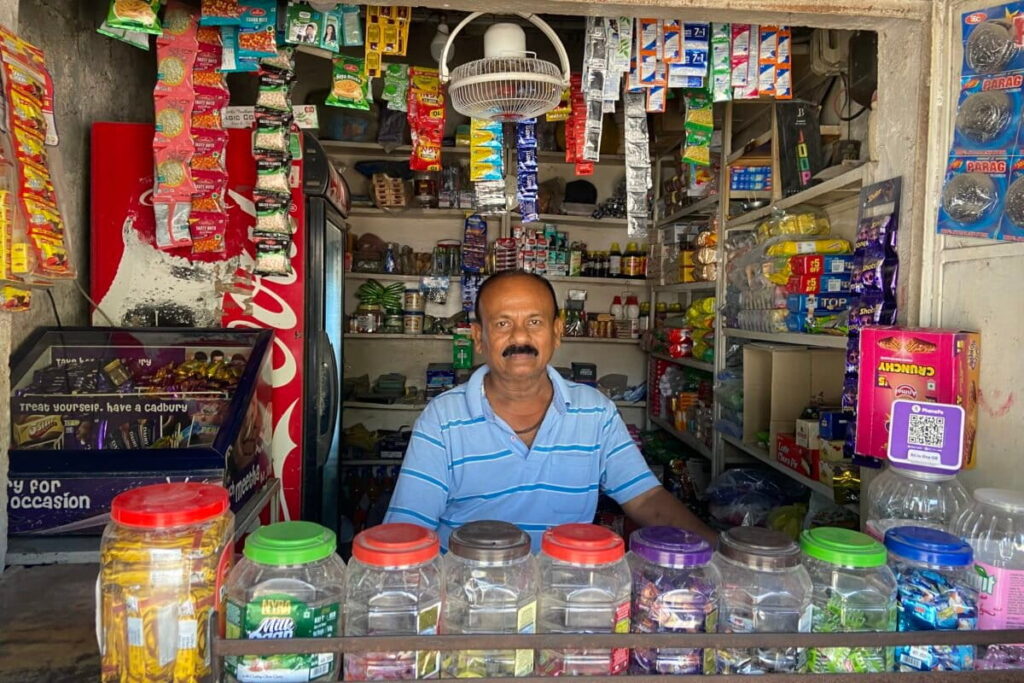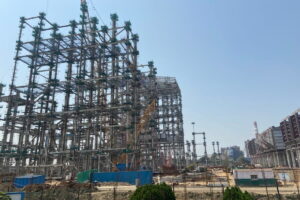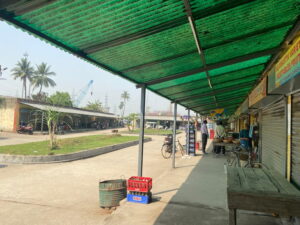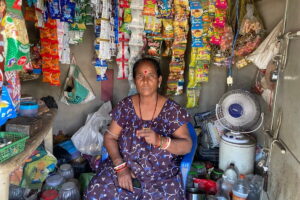Local Economies In Odisha Hit By Closure Of Thermal Power Plants
Nov 3, 2025 | Pratirodh Bureau
Betel shop owner Nrupati Jena in his shop near the gate of the thermal plant in Talcher, Odisha, that closed in 2021. Prior to its closing, Jena would earn ₹4,000 per day from plant workers. Today, his income has been cut by half, while other shops nearby have shut down completely (Image by Roli Srivastava)
- When a thermal power plant in Talcher, Odisha, closed, local markets that once thrived on workers’ daily spending, collapsed, leaving shopkeepers and small vendors struggling to survive.
- After decades of industrial pollution, the people of Talcher now face economic decline after the thermal power plant closure, underscoring how poorly managed transitions worsen social and environmental vulnerabilities.
- Experts say the closure of the thermal power plant exposes gaps in India’s planning for a just transition.
Roadside shops selling steaming hot chai and samosas were among the first to down their shutters. The lull then spread gradually across this bazaar, located in front of a major thermal power plant in eastern India, with shop after shop winding up business after their sole customer base, the plant’s workers, were forced to leave after the plant’s closure four years ago.
“This road was a thoroughfare,” said Nrupati Jena, 65. “Workers thronged my shop through the day; I had a daily business of ₹4,000.” Jena still sells biscuits, cigarettes, and paan (betel leaves) at the wide gate leading to the old plant, his shop the only one standing amidst shuttered ones.
“For three years now, my income has dropped to less than half,” he told Mongabay-India. “Nobody has asked us how we are surviving.”
The National Thermal Power Corporation (NTPC), India’s largest power company, retired its 460-MW Talcher Thermal Power Station (TTPS) in the mining hub of Odisha in March 2021. The move was fiercely contested by worker unions in court, as worker unions cited insufficient notice — of less than a month — given to the contractual workers who lost their jobs. The court finally allowed the plant’s closure in October of the same year, NTPC officials said.
While NTPC employees were transferred to other projects of the power giant, and nearly three-quarters of the contractual workers who lost their jobs have since been reinstated at the new under-construction plant, the invisible collateral damage was the approximately 120 shops in the two nearby market areas. Many shopkeepers from there returned to the undependable work of farming in the villages they had migrated from decades ago, while others took up odd jobs.
A few, like Jena, stayed on.
Warning for the future
This experience of Talcher’s shopkeepers, energy transition experts say, must guide India’s future actions to cushion fossil-fuel-dependent communities from the impact of imminent mine and thermal plant closures as the country builds its renewable capacity, aiming for a net-zero target by 2070.

The last of the shopkeepers in Talcher, where decades of coal mining and thermal plant operations have plummeted the town’s air quality to levels poorer than Delhi’s on occasion, now await a revival — in the form of a new, bigger thermal plant with a total 1320 MW capacity, with one unit expected to be functional by March 2027, NTPC officials said.
The Indian government, citing the ever-growing demand for energy and the need for energy security, is currently expanding coal mines and has decided not to shut any more thermal plants until 2030.
Energy transition experts note that the luxury of time this affords is an opportunity to strategise and build a post-coal future for local economies in coal-rich regions.
“The future of coal is uncertain, and planning to retire, repurpose, or upgrade a plant must begin 10 years before the closure. It is not like closing a small shop. It is a large-scale industry,” said Manideep Gudela, director, energy transition at the Centre for Energy, Environment and People (CEEP), a Jaipur-based research and policy advocacy nonprofit, who has visited Talcher among other thermal plants in the country to study the socio-economic impact of the plant’s closure.
Gudela said that communities, particularly in areas such as Talcher, are deeply linked to coal mining and power operations and risk severe impacts if the government and businesses do not plan well in advance. Citing local estimates, he said that nearly 500,000 people were directly or indirectly dependent on the Talcher plant’s operations for a living.
“There was time to plan for a post-closure industrial diversification,” he said, citing findings from his research into government records on thermal plant closures that show that the NTPC proposed to the CEA in June 2017 their intent to retire the existing 460 MW plant by December 2023. “There are other industries (beyond coal) that can be drawn to such regions. But the current focus of closures is to transition from coal to coal. This is a missed opportunity.”
The decline
Ice-cream parlour owner Biswanath Nahak, 56, had sensed an imminent decline in the years preceding the plant’s closure, even though shopkeepers like him were the last to find out about what workers said was a “sudden decision” to shut the plant. The steady stream of children who cycled to his shop for cones and ice-lollies had gradually thinned out, and officers who would stop by on a late evening stroll had one by one said their goodbyes.
“People were retiring and there were no new hires,” said Nahak, standing in his shop, now a photocopying centre, located inside the sprawling NTPC residential quarters, which in its prime housed nearly 5,000 people living in over 2,000 flats. The complex now wears a deserted look, with shopkeepers estimating that fewer than 200 people live here.
Nahak was drawn to the opportunity the thermal town offered as a young boy in the early 1990s. He was visiting his married sister in Talcher, from Ganjam, a district nearly 300 km away, but stayed on after seeing the town bustling with hundreds of workers. There would always be work here, he thought. His bet paid off. He started work as a newspaper boy, soon opened a photocopying shop, and finally set up an ice-cream parlour. “It was a bull run,” he said of the market.
Until the closure
India decided to close Talcher Thermal Power Station along with those of 19 other thermal facilities across the country between 2021 and 2023, following “a detailed technical and economic evaluation”, according to an NTPC and Indian government statement.

The closure led to 879 contractual workers losing their jobs while those on the company’s payroll were transferred to other NTPC plants, according to NTPC Workers’ Union president Bishnu Mohan Rath and NTPC officials.
Of the laid-off workers, 678 have been reinstated, 135 appointments are pending, 30 have reached retirement age since the closure, 24 have passed away, and the rest have moved to other jobs, Rath said.
Those reinstated speak of being offered labour jobs rather than the technical roles they handled at the old plant, though Rath said those concerns would also be sorted in a couple of years once the new plant was operational. NTPC said that most contractual workers affected by the closure were subsequently reemployed in the new project or provided employment through various agencies, with experienced workers given priority.
Officials cited new emission norms, the plant’s poor efficiency, and overall obsolete technology for the decision to close the plant, which dates back to 1967, when it was a major installation to serve India’s growing power demand. It went on to create jobs and nurture a local economy.
While the Indian government has stated that labourers and casual workers who may lose their jobs following thermal plant closures can be reemployed in other available jobs at NTPC, there is no such assurance for impacted shopkeepers.
Biswanath Behera, 55, owned a small repair shop for bicycles and motorbikes but was forced to close it after the workers left. “Now I cook food at wedding parties,” he said, adding that he earned ₹500 a day at his shop but now makes as little as ₹200 as a kitchen help, that too when he gets work. His biggest regret, however, is that he could not fund the higher education of his two sons, who have also taken up odd jobs.
Officials from Odisha’s industries department and Talcher’s district administration did not respond to phone, email, or WhatsApp queries about the state’s plan for industrial diversification in coal-dependent regions such as Talcher.
According to local media reports, in May this year, the state cleared proposals to set up industries of steel, iron and ferro alloys, industrial gases, logistics, food and beverage, agro-processing, tourism and hospitality, chemicals, and apparel and textile in 11 districts of Odisha, which include Angul, where Talcher town is located.
NTPC said that the plant’s closure in 2021 “has served as a valuable learning experience”. The energy giant told Mongabay-India that key takeaways included the need for “early engagement with stakeholders, structured re-skilling programmes, proactive communication with affected communities, and closer collaboration with state employment and development agencies”.
“These insights are actively shaping the company’s approach to future decommissioning or transition projects to minimise socio-economic disruptions,” the NTPC spokesperson said.
Burden of disease
The industrial district of Angul is dotted with coal mines, and steel and aluminum plants, its highways always busy with massive trucks ferrying metals and coal.

India’s Central Pollution Control Board categorises Talcher as a “critically polluted region,” its 2017 data showing its deteriorating air quality. It cites the town’s disease burden due to air pollution as “the second-largest risk factor responsible for premature deaths in Odisha.” Air pollution has also fuelled cases of ischaemic heart disease — when the heart muscle does not receive enough oxygen — and lower respiratory tract infections.
Respiratory diseases ranging from asthma to tuberculosis are common, said Dr. Madan Mohan Pradhan, chief district medical officer of Angul district, adding that compromised lungs were more prevalent among adults and the elderly due to their longer exposure to unclean air.
Shopkeeper Jena’s wife has been suffering from asthma for 15 years. She takes regular medication for her condition and has a nebuliser at home. Jena attributes his wife’s condition to the toxic air they breathe in Talcher, but said, “Our problems will not shut down the coal business.”
Like in most coal-dependent regions, despite polluted air and water, and the impact of mining and thermal power on all life forms, the fossil fuel remains a lifeline.
But communities in regions such as Talcher cannot be blamed for not being able to imagine a life beyond coal, said sociologist and water activist Ranjan Panda, convenor of Water Initiatives, a network that works on water, environmental, and climate change advocacy, especially for vulnerable communities.
“The conversation around ‘just transition’ (an equitable shift to a green, sustainable future that leaves no one behind) is elitist so far,” he said. “The communities are not being seen as primary stakeholders in this transition dialogue, which mainly involves technocrats. There are discussions on redesigning, repurposing technology, and reducing emissions. But communities that had coal thrust upon them decades ago are non-entities.”
A new thoroughfare
Meanwhile, another bazaar is taking shape about a kilometre from the old market, on a once-quiet stretch of road that is now a thoroughfare for workers and officials. Shops selling soft drinks, crisps, tobacco, groceries and even clothes and medicines have come up in the past six months on this road, which leads to a new gate constructed for labour entry to the new plant.
Local shopkeepers estimate that more than 2,000 workers have already come in from the states of Bihar, Jharkhand, Andhra Pradesh, Tamil Nadu, and Gujarat for the ongoing work on the new plant.
Among those who have set up shop here is Draupadi Raut. Her matchbox-sized store is stacked with bags of crisps, cookies, and dozens of small tobacco pouches in a polythene bag. The 47-year-old worked at the old plant for over two decades, earning a monthly income of 12,000 rupees, which she said was steady, unlike her income now.
But the new plant promises assured business, with an endless stream of customers stopping by to purchase water, tobacco, or a small packet of potato wafers on a hot, sleepy afternoon. In the past six months, the road has been widened and streetlights installed.
The old market’s shopkeepers said they had no access to the land alongside the new road, as it was privately owned and they didn’t have the funds to lease a shop there.
For Jena, the gate of the old plant remains home.
“I haven’t thought of moving. This is my shop. I have been here since I was a 10-year-old, helping my father. Many shops have closed down, but the market is still there,” said Jena, sitting idle behind the counter on a weekday morning, a couple of local men hanging around for a chat.
“With the plant’s revival, I do hope workers will return to this market. Business might then improve,” he said.
(Published under Creative Commons from Mongabay India)
